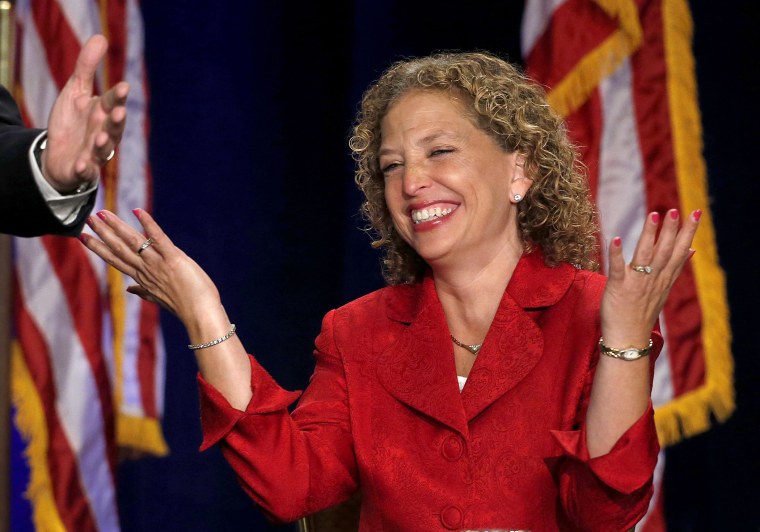In the wake of the 2012 elections, the Republican National Committee created a task force intended to conduct an "autopsy" on the party's failed cycle. The result was a lengthy document, called the "
Growth and Opportunity Project," intended to tell the party what went wrong and what party officials should do to get back on track.
Almost immediately, Republican officials threw the "Growth and Opportunity Project"
in the trash, ignored the findings, and did largely the opposite of what the task force recommended.
Two years later, it's Democrats coming off a rough election cycle, and it's the center-left party taking the opportunity
to be introspective for a while.
At its annual winter meeting, the Democratic National Committee released the preliminary findings of its Democratic Victory Task Force, which DNC Chair Rep. Debbie Wasserman Schultz announced following the midterms. Some areas the task force targeted for immediate improvement are strengthening partnerships with state parties and expanding the right to vote. [...] "...There is no single narrative that unites all of our work and the issues that we care about as a community of Democrats," the DNC's report states. "It is strongly believed that the Democratic Party is loosely understood as a long list of policy statements and not as people with a common set of core values (fairness, equality, opportunity). This lack of cohesive narrative impedes the party's ability to develop and maintain a lifelong dialogue and partnership with voters."
While the RNC's autopsy was 102 pages, the DNC's document is
a breezy nine pages, including the content-free front and back covers. (This is evidently a "
preliminary" report. It's not clear if a more comprehensive document is on the way later in the year.)
While some of the ideas in the document seem to have real merit, including an aggressive emphasis on voter registration, others seem considerably less valuable, such as the "creation of a National Narrative Project to work with party leaders, activists, and messaging and narrative experts to create a strong values-based national narrative."
What stood out as especially noteworthy, however, was the DNC's willingness to look ahead -- not to 2016, but
to 2020:
The DNC's report, helmed by a 10-member group, also looks at the Republican's current "stranglehold on state houses, governorships and congressional seats," and notes Democrats need to grow during the next redistricting, which is set to happen after the 2020 elections.
In Democratic circles, there's a realization that the 2010 cycle wasn't just a setback, it was effectively a national disaster. When Republicans won big in 2010, they were able to redraw district lines, giving themselves a decade-long lock on the House majority, effectively guaranteeing a dysfunctional, often ridiculous Congress through 2020. This same cycle helped the GOP solidify gains in state legislatures, too.
In very real, practical terms, the 2010 midterms started a rolling national political crisis that Americans will continue to deal with the consequences of for at least another five years.
And with this in mind, Democrats seem to realize that 2020 -- a presidential election cycle, not a midterm cycle as it was in 2010 -- will be critically important to undoing at least some of the damage in the next decade that's been done in this decade.
The Democrats' focus on this seemingly far-off cycle isn't just evident in the DNC's "autopsy"; it was also clear last week when the Democratic Legislative Campaign Committee
launched the Advantage 2020 super PAC, to be led by Michigan's Mark Schauer, who narrowly lost a gubernatorial race last November. Benjy Sarlin's
report on this last week is well worth your time.
